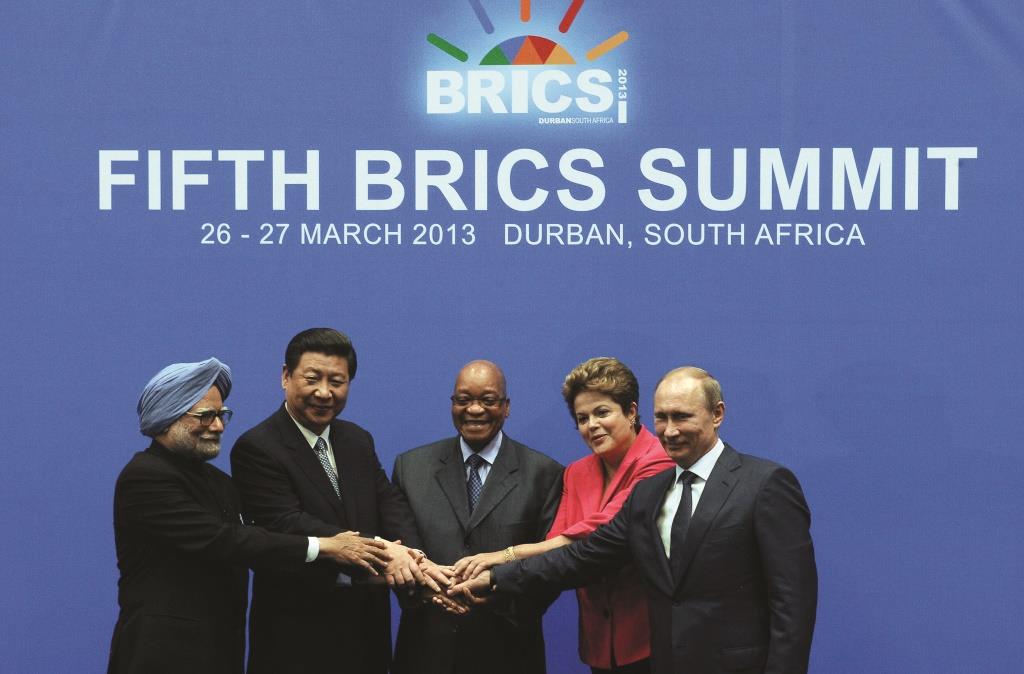In its five-year history, the community of countries that make up BRICS (Brazil, Russia, India, China and South Africa)—collectively home to 45% of the world’s population; 20% of output and whose contribution to global economic growth over the last decade has reached 50%—has been more pilloried than praised.
And its critics made it clear that they were not about to let up. Brazil’s Dilma Rousseff, Russia’s Vladimir Putin, China’s newly-elected leader Xi Jinping, host Jacob Zuma, and Indian Prime Minister Manmohan Singh, met again on March 26-27, for the first time on African soil, in Durban, South Africa. They were joined by 15 of Africa’s 54 heads of state.
Bold announcements at the end of the summit did not seem to placate the critics either—including the decision to create a Brics development bank that could rival the World Bank and the IMF; the signing of a Contingent Reserve Agreement (CRA) to pool $100 bilion from the five countries’ reserves; as well as a Multilateral Agreement on Co-operation and Co-financing for Sustainable Development.
Although grudging acknowledgements were made here and there and backhanded compliments were given, the coverage of major American and British publications was around inherent problems within and among the BRICS countries.
“The alliance faces serious questions about whether the member countries have enough in common and enough shared goals to function effectively as a counterweight to the West. For all the talk of solidarity among emerging giants, the group’s concrete achievements have been few… partly because its members are deeply divided on some basic issues and are in many ways rivals, not allies, in the global economy,” wrote the New York Times.
Loading...
Parallels were drawn between India, Brazil and South Africa’s strong democratic traditions on the one hand, and Russia and China’s autocratic one on the other, although the good democrats were not spared either. The host country came in for a hiding for its small economy and anemic growth rates, while Brazil’s economy had cooled drastically, and India’s hope of reaching double-digit growth had ebbed.
The BRICS economic development ministers, met ahead of their heads of state to tie down decisions for final approval. They must have wondered as to whether there was any co-incidence in the release, the day before the BRICS summit, of a comprehensive report of the United Nations Conference on Trade and Development. The detailed report showed how the BRICS countries hardly invest in one another, preferring their neighbors and the developed world’s major economies instead, like those of the European Union, the United States and Japan.
Previous remarks of President Zuma, criticizing the way trade was conducted between China and the African continent were hauled out to show how he had appeared to have a change of heart before the summit meeting. But the same was not done to Sanusi Lamido Sanusi, the 2011 FORBES AFRICA Person of the Year and head of Nigeria’s central bank, who has been just as critical of the International Monetary Fund (IMF) and the World Bank as he was in the opinion article published in The Financial Times about how China has grown to be “a significant contributor to Africa’s de-industrialization and underdevelopment”.
The morning after the summit, China threw a lavish breakfast for the African heads of state. There are no prizes for guessing why it felt the need to do so.
With the promises of the BRICS heads of state from the previous afternoon’s session gnawing at their minds, African leaders were queuing up, one by one, at the office of their host. The purpose of the meetings were to strike the iron while it is still hot—ostensibly to open discussions that could lead to trade deals and to make sure they were not taken for a ride as guests who just came to hobnob and have a party.
Indeed, the time for African leaders to party and enjoy crumbs falling from their dishonorable colonial friends, while the looting of the continent’s resources continues unabated, is over. And so too should be the growing tendency of having too few people—usually a motley bunch of well-connected, cigar-puffing, whisky-drinking and posh-car-driving elite—benefitting handsomely from the opportunities that are being created by the world’s renewed focus on the continent.
According to Standard Bank, BRICS-Africa trade will increase threefold, from $150 billion in 2010 to $530 billion in 2015. Between 2010 and 2015, BRICS’ share of Africa’s total trade will increase from one-fifth to one-third and BRICS FDI stock in Africa will swell from around $60 billion in 2009 to more than $150 billion by 2015. The IMF also conducted a study, which indicated that the trade and investment from BRICS to low-income countries was deemed as a critical factor to protect them from the shock of the recent global recession.
With all its remaining problems and imperfections, Africa is a much better place today than it was two decades ago. But leaders would do well to remember that the reason coup d’états are frowned upon, elections are held regularly, and governments are a lot more open and transparent, is because Africa’s people are ready to take care of their own destiny, if they feel that their leaders are betraying their trust.
BRICS and many other opportunities that are sure to come our way need not be squandered.
And given our dreadful colonial past, now is the time to be even more vigilant. It’s the only way to deal with the derision emanating from pretentious, ideological dispositions of the western media, its commentators and research institutions—all of whom seem to have conveniently forgotten how they built their countries on the carcasses of Africans, their mineral resources, and how those structural adjustment programs imposed on the ‘dark continent’ by the IMFs and the World Banks of the so-called first world, have continued to play their part in strangulating many an African country, to this day.
Loading...
